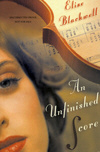An Unfinished Score
An Unfinished Score is not a novel to get lost in. It is a tough novel, well-written, with major and minor rhythms coursing through it to carry the plot. It is broad and narrow at the same time. It is an exploration of grief, the history of music, being an artist, the concept of hearing, and the emotional life of a woman torn between her every day and a fantasy world.
An Unfinished Score is not a novel to get lost in. It is a tough novel, well-written, with major and minor rhythms coursing through it to carry the plot. It is broad and narrow at the same time. It is an exploration of grief, the history of music, being an artist, the concept of hearing, and the emotional life of a woman torn between her every day and a fantasy world.
The novel quickly establishes its rhythm, starting from the first two lines “She hears the words on the radio. It is the radio that announces her lover’s death.” At times stark, at times labyrinthine, Blackwell’s prose works like a symphony – some lines seem purposefully disharmonic, as if to add to the uncomfortable, yet familiar, struggle that the protagonist, Suzanne, goes through over the course of the book.
By the end of the first chapter, it is more than apparent that the world this novel inhabits is not typical. Suzanne and her husband, Ben, share a home with Suzanne’s best friend, Petra, and Petra’s young daughter, Adele. Adele is deaf, and Suzanne, Petra, and Ben are all musicians (viola, violin, and cello, respectively). By the end of the first scene of the novel, after Suzanne learns of her lover’s death, and the quartet share a relatively uneventful dinner, the reader can cut the tension within their household with a knife.
An Unfinished Score begins slowly, exploring the terrain of Suzanne’s grief-stricken mind, as she processes the death of her lover, Alex. Alex, a well-known conductor with whom Suzanne has been having an affair for four years, dominates Suzanne’s mind and motivation for much of the novel. She holds close, perhaps too close, her memories of him, which in turn impairs her ability to see and her judgment. Throughout the novel, she is moving through a world that she never fully interacts with: “Suzanne does not remember the dream, yet waking feels like escaping someone else’s brain, as though she’s been imprisoned in another head and is running down a foreign tongue, panicked to breathe fresh air before she is closed in forever.”
The first section of the book delves deeply into her psyche, moving nonlinearly through Suzanne’s life: her poor childhood, her mother’s struggles to support her, her father’s emotional abandonment of the family, her time as a music student, meeting Petra, meeting and marrying Ben, falling in love with Alex. Some parts of the first section meander in an unfocused way, forcing the reader to wonder where to story will go.
The second section opens with Suzanne meeting Alex’s widow, Olivia, a well-bred and formidable character with revenge to enact on the woman who almost stole her husband. From here, the story becomes a vortex, pulling the reader in, sometimes moving at great speed and disorienting the reader, other times moving carefully over the landscape of creativity, love, heartbreak, loss, and ultimately coming to a crescendo of truth.
Though Suzanne dominates the story, the other characters are well-drawn. Petra, an “old-fashioned Swedish beauty” provides comic relief, and a subtle edge to the story. She feels like she cannot raise Adele alone, and because of this, distances herself from her daughter, leaving Suzanne to stand in as the mother figure. Adele’s quiet presence, and the looming possibility of her receiving cochlear implants, constantly evokes the concept of what hearing is. Her frustration at not being able to “hear” the music her mother and Suzanne play is artfully rendered. In one scene, Suzanne and Petra bring Adele to a concert of Ben’s, and Suzanne watches Adele’s reaction “A deaf child at a concert many adults couldn’t sit through, she looks not bored, but rapt. Her chest rises and falls slowly with her deep breathing, and her eyes open fully to take in the darkened scene”; as the concert progresses, “Adele is smiling and indeed looks to Suzanne as though she, too, is suffused by the music she cannot hear.” As for Ben, his presence is more felt than known, and could be likened to an absence as well. He is both there, and not there.
The music theme of the novel certainly lends to its success, but at some points, it also seems to hold it back. Petra’s endless viola jokes, Suzanne’s reliving of each concert hall and concert she sat through with Alex, the histories of composers woven throughout – these details sometimes distract from the actual story. A reader with no concept of orchestration, composition, or music theory might find themselves confused by the references.
An Unfinished Score is an emotional novel. It is a book that asks for sympathy and contemplation. Exploring the complexity of classical music, the lives that create and perform it, and nothing less complicated than the inner workings of the human heart, the book is ultimately an orchestra of its own, beautifully composed and richly textured.





